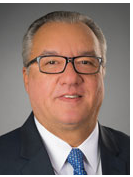Market Segment

April 12, 2022
Cleveland-Cliffs CEO Goncalves Blasts Low Tariffs on Russian Pig Iron
Written by Michael Cowden
Cleveland-Cliffs Inc. chairman, president and CEO Lourenco Goncalves blasted low US tariffs on Russian pig iron given sharply higher ones on steel.
The pig iron tariff – $1.11 per metric ton, or $1 per short ton – is too little to stop companies, notably electric-arc furnace (EAF) sheet mills, from importing raw material from Russia, he said.

Goncalves, head of the largest sheet producer in the US, made the comment on Monday, April 11, during a press conference at Cliffs’ Indiana Harbor steel mill East Chicago, Ind.
He was referring to Russia joining North Korea and other rogue nations in losing “normal” trade relations with the US. That resulted in tariffs of roughly 20-40% on steel from Russia going into place on Saturday. Tariffs on pig iron, in contrast, increased by a negligible amount.
Also in attendance at the press conference was Rep. Frank Mrvan (D-Ind.). Mrvan is co-chairman of the Congressional Steel Caucus. His northwest Indiana district includes one of the largest steelmaking hubs in the United States.
Mrvan spoke about the need to shorten domestic supply chains. He also said the Steel Caucus was “working extremely hard” to bolster Section 232 tariffs and quotas.
Both Section 232 and the tariffs on Russia can be revised upward by the president in consulation with Congress.
“What we have learned – not only through the pandemic but now through this horrible conflict that is going on in Ukraine – is how important it is to be self-sufficient in producing our steel and how important it is to make sure that we are investing in this industry,” Mrvan said.
Goncalves agreed. Russian pig iron exports to the US last year were worth $1.2 billion, slightly more than the $1.1 billion in steel shipped to domestic ports in 2021, he said. “So pig iron alone was more than steel. And they got a pass.”
Cliffs is “absolutely” willing and able to supply pig iron to EAF producers from its mills in the Midwest. But the Cleveland-based steelmaker has received no interest from potential customers, Goncalves said.
“I can’t sell to people who don’t come to buy. They prefer to buy Russian, and they are allowed to by the US government,” he said.
Goncalves said one reason for the low tariffs was that pig iron imports from Russia were not a consideration when the rates were first calculated in the 1930s. The Russian Federation did not exist in its current form then. And trade between the US and the former Soviet Union was practically non-existent during the Cold War in the following decades.
It wasn’t an issue until the late 1980s, when EAF sheet mills realized they needed pig iron to make more demanding grades of sheet. That also happened to be when the opening, and subsequent collapse, of the former Soviet Union meant imported pig iron was abundant and cheap.
But that status quo no longer makes sense, especially not in 2022, he said.
Still, Goncalves said he was not lobbying for increasing pig iron tariffs on Russia. Because doing so would only increase or accelerate shipments of cheap Russian pig iron to other destinations, notably China.
“That pig iron from Russia will find a place. And I will bet my life that the place that pig iron will go will be China. Because they are friends, they are birds of a feather,” he said. “And all of a sudden China would be sending Chinese pig iron to the United States – it’s called transshipment.”
The solution, in other words, is not higher tariffs on one nation but a reconsideration of the foundations of current supply chains. Another thing to consider is CO2 emissions. Goncalves noted that Cliffs’ integrated mills in the Midwest had lower CO2 emissions than integrated mills abroad – including those in other developed nations such as Japan and South Korea.
As Goncalves sees it, the solution is for the US government and EAF sheet mills to “acknowledge the truth” that pig iron is necessary to produce sheet and that it is available from non-adversaries.
Indiana Harbor produces pig iron, as do Cliffs’ mills in Burns Harbor, Ind., Middletown, Ohio, and Dearborn, Mich. “If they need to buy pig iron, I have it for sale,” he said.
By Michael Cowden, Michael@SteelMarketUpdate.com







